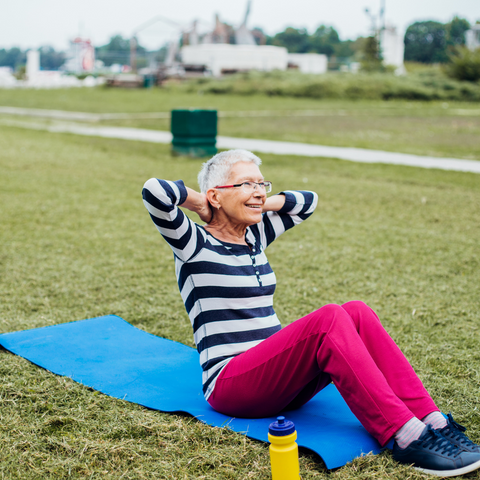Strong Body = Strong Pelvic Floor
There is no doubt that regular exercise is beneficial to both your body and mind, but have you ever considered how a stronger body can actually lead to a stronger pelvic floor?
When you move your body regularly, your blood and lymphatic fluid are circulated throughout your body. This means that your tissues can get a healthy supply of oxygen, helping your organs to function at their best, especially the heart and lungs. The same applies to your pelvic muscles meaning regular exercise can lead to a stronger pelvic floor.

As well as oxygenation of the body's tissues, regular exercise creates stronger muscles throughout the body. A stronger body is much more equipped to support your pelvic floor. Strong muscles in the surrounding area means your organs are better supported with a lower chance of pelvic organ prolapse. A strong pelvic region also means that bladder leakage is avoided or improved.
Regular exercise can decrease vaginal dryness
Vaginal dryness is a common problem especially with those women approaching menopause. Proper blood flow and circulation can help the vagina to stay lubricated and for it’s owner to stay more comfortable. Some studies even show that regular exercise can increase the levels of estrogen in postmenopausal women (low estrogen is a major cause of vaginal dryness). If you’re looking for more information about increasing your estrogen levels then be sure to take a look at our Boost Estrogen Naturally eBook which is jam packed full of invaluable information and some delicious recipes to help boost your estrogen holistically.

Exercise helps your body to be strong and healthy
Aside from the benefits to your pelvic floor, regular exercise benefits every part of your body and its function;
- Insulin levels usually decrease with exercise, which is obviously beneficial to those with diabetes or insulin resistance.
- The hormone cortisol, otherwise known as ‘ the stress hormone’ can also be decreased with low intensity workouts. It’s important to note that cortisol can actually increase with vigorous or high intensity exercise so choose your workout mindfully.
- Exercise is brilliant for your mental health and wellbeing. It helps decrease depression and anxiety and increase memory and cognitive function.
- Weight bearing exercise can help increase bone density too. This is important as bone loss is quickly accelerated towards the menopause meaning your bones are more prone to breakage.
- Exercise has been shown to decrease pain in those with chronic pain, as well as increasing mobility. Yoga is a great example of this.

Final thoughts...
So there we have it, a strong body benefits every aspect of your body and it’s function including your pelvic floor. If you're struggling with a weak pelvic floor or pelvic floor dysfunction then speak with your pelvic floor physio or medical practitioner for advice on safe exercise. Doing exercises incorrectly or with too high of an intensity can be detrimental to your pelvic floor so be sure to seek proper advice if you’re unsure.
Resources
Why Women Over 40 Need To Create A Strong Body Right NOW - Pelvic Pain Relief










